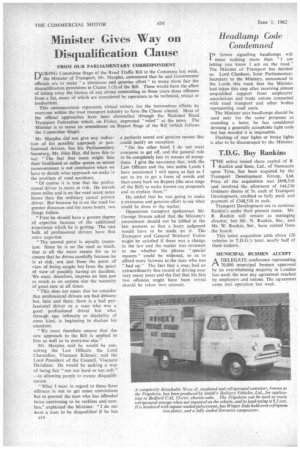Minister Gives Way on Disqualification Clause
Page 44

If you've noticed an error in this article please click here to report it so we can fix it.
FROM OUR PARLIAMENTARY CORRESPONDENT
DUR1NG Committee Stage of the Road Traffic Bill in the Commons last week, the Minister of Transport, Mr. Marples, announced that he and Government officials are to make " a strenuous and genuine effort" to make more fair the disqualification provisions in Clause 3(3) of the Bill. These would have the effect of taking away the licence of any driver committing in three years three offences from a list, many of which are considered by operators to be technical, trivial or inadvertent.
This announcement represents virtual victory for the tremendous efforts by everyone within the road transport industry to have the Clause altered. Most of the official approaches have been channelled through the National Road Transport Federation which, on Friday, expressed "relief" at the news. The Minister is to move an amendment on Report Stage of the Bill (which follows the Committee Stage).
Mr. Marples did not give any indication of his possible approach to professional drivers, but his Parliamentary Secretary, Mr. John Hay, did have this to say: "The fact that some might lose their livelihood or suffer severe or minor inconvenience is not conclusive when we have to decide what approach we make to the problem of road accidents.
"Of course it is true that the professional driver is more at risk. He travels more miles and is on the road many more hours than the ordinary casual private driver. But because he is on the road for greater distances and for more hours, two things follow.
"First he should have a greater degree of expertise because of the additional experience which he is getting. The vast bulk of professional drivers have that extra expertise.
"The second point is equally important. Since he is on the road so much, that is all the more reason for us to ensure that he drives carefully because he is at risk, not just from the point of view of being caught but from the point of view of possibly having an accident. We must, therefore, impress on him just as much as on anyone else the necessity of great care at all times.
"This does not mean that we consider that professional drivers are bad drivers; but, here and there, there is a bad professional driver or a man who was a good professional driver but who, through age, infirmity or disability of some kind, is beginning to slacken his attention.
"We must therefore ensure that the new approach to the Bill is applied to him as well as to everyone else."
Mr. Marples said he would be consulting the Law Officers, the Lord Chancellor, Viscount Kihnuir, and the Lord President of the Council, Viscount Hailsham. He would be seeking a way of being fair "not too hard or too soft" —in allowing people to escape disqualification.
"What I want in regard to these three offences is not to get more convictions but to prevent the man who has offended twice continuing to be reckless and careless," explained the Minister. "I do not want a man to be disqualified if he has a perfectly sound and genuine reason that could justify an exception.
"On the other hand I do not want everyone to get off, and the general rule to be completely lost in masses of exceptions. I give the assurance that, with the Law Officers and the two noble Lords I have mentioned I will move as fast as I can to try to get a form of words and then come back on Report (the next stage • of the Bill) to make known my proposals and to explain them."
He added that he was going to make a strenuous and genuine effort to see what could be done in the matter.
Opposition transport spokesman Mr. George Strauss asked that the Minister's amendment should not be tabled at the last moment so that a hasty judgment would have to be made on it. The Transport and General Workers' Union might be satisfied if there was a change in the law and the matter was reviewed to see whether the phrase "special reasons" could be widened, so as to afford more fairness to the man who was "had up." The fact that a man had an extraordinarily fine record of driving over very many years and the fact that his first two offences might have been trivial should be taken into account.






































































































































































